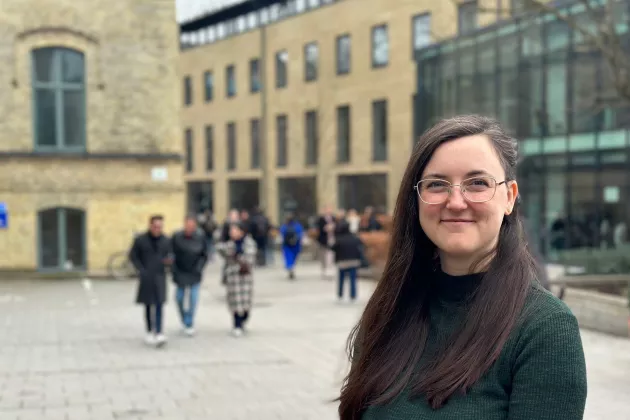Can you tell us about your background leading up to this point?
"I come from the US, Wisconsin, and my academic journey took me through global studies and human rights. Before Sweden, I worked with women's rights groups in the US and Kenya, before I left for master studies in Uppsala. During those studies I received a Rotary Peace Fellowship and was studying positive peace and food security in the US territory Guam.
I think I have always been interested in sustainability. I remember how I – as a 10-year-old – wanted to become an architect and sketched houses with solar panels."
Could you explain your research for a wider audience?
"My research explores the intersection between gender, climate change, and peace, and how they are connected. If we address one, we address the others. I do this through a lens of care; in addition to numbers on temperatures, sea level rising and carbon dioxide the lens of care is about how we value and practice care in our everyday life. Essentially, I am working with care-based knowledge of how we are looking at climate change through the lens of how we experience peace and how we work towards peace."
What surprised you the most in your research findings?
"I was surprised by the significant role care plays in shaping responses to climate change and peace. For example, we see a lot of discussion on how to limit economic harm and all the economy losses. But our emotional and cultural losses due to climate change also matter.”
How did you do your fieldwork in Puerto Rico?
“I made two main trips to Puerto Rico for research, spending around 7 months there overall. While I was there doing fieldwork, I conducted participatory observation and interviews with different people and community groups working related to peacebuilding, social justice, and climate action. I participated in demonstrations or marches, special events organized around caring for nature or for education, and also everyday tasks – I worked on-site with two organizations for longer periods of time to really get to know how they work and support their ongoing processes.”
What were some key findings from that fieldwork?
"One key finding from Puerto Rico is the importance of imagination and caring for each other in addressing climate change. I observed how community groups are driven by imaginations of utopia, and how this plays a critical role in tackling violences related to climate change and to building peace. The visions of utopia can look very different and include both nostalgia for the past, where we long for the way things used to be, and for some yet unknown future that we imagine.”
You have also used artistically orientated methods in your research, in what way?
“During my more in-depth work with the two organizations, art became a partly spontaneous tool for my methods of participation, observation, and interviewing. I liked it because it made the process more collaborative and a two-way process. For example, I created zines that tell different stories from the groups, based on interviews and activities. I combined words from my own and from participant experiences and stories I learned through secondary research with illustrations and photographs. These zines helped discussions evolve between us, introduced new lines of thought or connections between ideas, and allowed me to contribute to their work with tangible outputs.”
How do you feel about receiving the award?
"I am quite overwhelmed. In my research I feel like I am in my own corner, so I am touched that this is considered to something of note beyond my circle. "
How do you plan to use the prize money, and what are your plans after completing your dissertation on 26 April?
"The first question is very easy to answer. I plan to use the prize money to return to Puerto Rico, I will plan the next steps for future collaborations together with groups there. I plan to go as soon as possible, unless I get a fantastic job! After completing my dissertation, I aim to continue doing academic research and teaching and if I could choose, my home base would be here after my eight years in Sweden."
What was the most significant aspect of being part of the Agenda 2030 Graduate School?
"The sense of community and the opportunities for collaboration were invaluable. It created a space for trying out new things, through workshops, seminars, and our PhD conference. It is an environment where we can learn from each other and explore new ideas and possibilities.”
Read more about Christie Nicoson and her research
Read more about the Agenda 2030 Award
Lund University Agenda 2030 Award
The award aims to promote innovative, interdisciplinary research on sustainable development by early career researchers. The prize is worth SEK 25 000 and is awarded annually by Lund University's research school Agenda 2030 in collaboration with the company Elis Textil Service AB, the first company in Sweden to be certified for its work on the Sustainable Development Goals.
This year's winner
Christie Nicoson, Department of Political Science
Honourable mention
Alezini Loxa, Department of Law
Honourable mention
Phil Flores, Department of Business Administration (now at Wageningen University, Netherlands)
Previous winners of the Agenda 2030 Award
Read and be inspired by the winners of the Agenda 2030 Award 2023 and 2022.
Timothée Parrique is the 2023 winner of the award
Alexandra Nikoleris it the 2022 winner of the award (in Swedish) - lu.se


